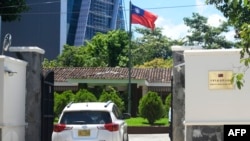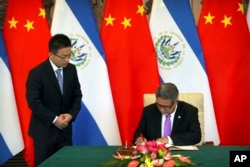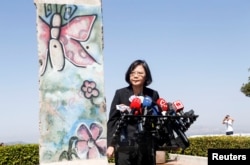The United States on Thursday attacked El Salvador's decision to ditch diplomatic ties with Taiwan in favor of China, saying the change was of grave concern to Washington and warning that China was offering economic inducements to seek domination.
Self-ruled Taiwan now has formal relations with only 17 countries, almost all of them small and less developed nations in Central America and the Pacific, including Belize and Nauru.
Taiwan President Tsai Ing-wen this week vowed to fight China's "increasingly out of control" behavior as El Salvador became the third country to switch allegiance to Beijing this year. China views Taiwan as a wayward province, with no right to state-to-state ties.
In a statement likely to inflame already strained relations with Beijing, the White House said El Salvador's government had made the decision "in a non-transparent fashion only months before they leave office."
"The El Salvadoran government's receptiveness to China's apparent interference in the domestic politics of a Western Hemisphere country is of grave concern to the United States, and will result in a re-evaluation of our relationship with El Salvador," it said.
Countries wanting to open or expand ties with China to get state-directed investment for short-term economic growth and infrastructure may be disappointed in the long run, the White House said.
"Around the world, governments are waking up to the fact that China's economic inducements facilitate economic dependency and domination, not partnership," it said.
Taiwan has accused China of luring its friends away with offers of generous aid packages. China denies that.
There was no immediate response in Taipei or Beijing to the White House statement.
Washington does not have diplomatic relations with Taipei, but is the democratic island's main arms supplier and strongest international backer.
China's hostility to Taiwan has grown since Tsai's election two years ago as Beijing fears she wishes to push for the island's formal independence, a red line for China.
She says she wants to maintain the status quo but will defend Taiwan's democracy.
China has stepped up efforts to restrict Taiwan's international presence, including ordering foreign airlines to list Taiwan as part of China on their websites, and has been conducting regular military exercises near the island.
The White House added that the United States will continue to oppose China's "destabilization of the cross-Strait relationship and political interference in the Western Hemisphere."
'Big deal'
The U.S. criticism came as U.S. and Chinese officials ended two days of trade talks with no major breakthrough as their bitter trade dispute escalated with activation of another round of dueling tariffs on $16 billion worth of each country's goods.
The U.S. statement was issued about 12 hours after U.S. President Donald Trump met lawmakers about the Foreign Investment Risk Review Modernization Act (FIRRMA), aimed at beefing up protection against foreign trade-secret poaching, as well as reviewing real estate transactions near ports or U.S. military installations or other sensitive government sites.
Trump was in congratulatory mode over what he considers to be a positive trajectory on U.S. efforts to crack down on such intrusions.
"This is a very big deal," he said.
Previously, Trump said, there were few safeguards.
"We had, in many cases, no safeguards. Now we have probably the best there is in the world. We'll see if that's good enough," he said.
"When we see something we don't like, some country is buying something we don't want them to be buying, we stop it. We now have the right to stop it."
John Cornyn, a Republican senator from Texas, praised the moves.
"Mr. President, in your administration you are finally taking the big step to oppose the national security threat posed by China," Cornyn said.







